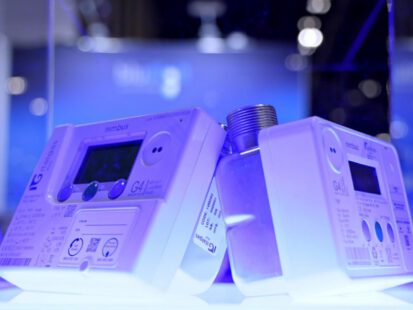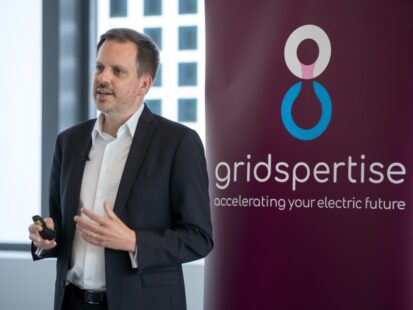
In our quest for a sustainable energy future, smart meters are crucial, writes Tomás Llobet of ESMIG.
Smart meters accelerate the digital and green transition, enabling a smarter energy infrastructure build-up, and ultimately contributing to more secure and affordable energy for consumers.
Let’s first delve into the significance of smart meters and how they are changing the energy landscape.
Firstly, smart meters play a key role as they allow utilities and consumers to monitor and optimise energy usage 24/7. This encourages the adoption of variable renewable energy sources and reduces carbon footprints.
Have you seen?
Investment needed to keep grid fit for purpose says Enel Grids boss
How France is leading in the digitalisation of its electrical grid
Secondly, smart meters facilitate the twin transition through the integration of solar panels, electric vehicles, heat pumps and other clean, distributed energy resources into the grid.
And smart meters enable a smarter, more resilient energy infrastructure. They allow utilities to pinpoint issues such as outages quickly, minimising downtime and driving resource efficiency.
Furthermore, the data collected from smart meters aids in predictive maintenance, ensuring that the energy infrastructure is resilient and efficient. This, in turn, enhances the security of energy supply while reducing operational costs.
One of the most significant benefits of smart meters is the potential for cost savings.
Deploying smart energy solutions leads to efficient energy use, resulting in lower consumer bills. By providing real-time data on energy usage, consumers can make informed decisions.
They can adjust their usage patterns, invest in energy-efficient appliances, and participate in demand response programmes, ultimately reducing their energy costs.
The true power of smart meters lies in their ability to generate granular consumption data, key to unlocking the full potential of the green and digital energy transformation.
With data-driven insights, utilities can anticipate peaks in consumption. Energy data offers invaluable insights into how energy is consumed. By analysing this data, utilities can optimise energy distribution and improve efficiency.
With access to data, innovative service providers can tailor their offers, such as dynamic tariffs, and provide solutions that benefit consumers, responding to their needs.
In conclusion, smart meters are much more than devices that accurately measure energy consumption; they are catalysts for change in our energy landscape.
They accelerate the green transition, build smarter and more resilient infrastructure, contribute to secure and affordable energy, and unleash the power of energy data for empowering consumers and a more sustainable future.
European rollout
The deployment of smart meters has been mandated by EU legislation since 2009. Back then there was already a clear understanding of the value they can create for both utilities and consumers.
Despite that, the progress of rolling out smart meters has been much slower than expected.
The target, which was set back then, to make sure that at least 80% of consumers would benefit from having an electricity smart meter in 2020, was missed by a long shot. Smart meter penetration is at around an average of 56% in the EU today. Let’s have a closer look at the state of smart meter rollouts in Europe today.
An uneven picture emerges when comparing the situation in the individual countries: while some member states have barely started their national smart meter rollout, others have completed them at 100% and are already deploying or planning to deploy a second generation of smart meters.
According to the latest available figures, at the end of 2022, only 13 or just about half of the EU member states had reached the 80% target, of which 11 had reached rollout rates well above 90%.
The countries that are most advanced and have embraced smart metering early on are mostly in the Nordics and in the Baltic region, where there is a high level of trust in technology and data-driven solutions as well as in (south-)western Europe, where large DSOs, notably in France, Italy and Spain have been key drivers.
Denmark, Estonia, Finland, Sweden, and Spain have already 100% completed their rollouts.
Some countries are already starting their second-generation rollout, such as Italy, or are in advanced planning stages for the deployment of a next generation of smart meters — this is the case in Finland, the Netherlands, or Sweden.
All but five EU member states, which have not yet started rollouts nor announced any deployment targets, have now reached at least 10% installation of electricity smart meters, indicating a first step in larger-scale rollouts.
Germany – Europe’s largest economy — has been lagging in the rollout of smart energy solutions for over a decade to the detriment of German energy consumers and the digitalisation of the energy transition.
With a new ‘Smart Meter Act’, adopted earlier in 2023, including a binding roadmap with clear targets for the installation of smart electricity meters by 2032, this situation is finally being redressed.
Deployment is also expected to catch up in the coming years in other EU countries which have been falling behind.
Unleashing full potential
As the deployment of smart meters is far from completed in Europe, the degrees of functionalities and use cases also vary significantly.
Recent analysis from Europe’s energy regulators (see ACER-CEER’s 2023 Market Monitoring Report) shows that while real-time/hourly energy pricing is available in most countries that have deployed smart meters, especially in the ones that are more advanced, critical peak pricing in the EU is only available in Denmark, France, Latvia, and Slovenia.
Similarly, the remote control of consumption, such as remotely-operated heat pumps, is only available in six countries in Europe.
This shows that rolling out smart meters alone is not all which is required to offer all the benefits for the system and consumer: they need to be used to their full potential to enable and support the value creation and put consumers at the heart of the twin transition.
To unleash the full potential of smart metering, completing the rollouts must go hand in hand with:
- Making data interoperable, available, and free of charge and in a non-discriminatory manner to all energy market participants, removing barriers to data access and sharing;
- Allowing all use cases, including for automation technologies and AI-powered solutions, to be enabled to fully support efficiency and integrating smart appliances;
- Enabling demand-side flexibility, in removing all barriers for active and voluntary participation of all energy end-users, in smart connected and automated systems.
The energy crisis has shown how consumers without access to smart meters and the multiple benefits they provide are disadvantaged, especially in periods of scarcity and high prices.
The time to accelerate and complete the large-scale rollout of smart meters across Europe, to remove barriers to accessing data and enable all functionalities and use cases for smart meters to create value is now.
Tomás Llobet is Managing Director of ESMIG.



